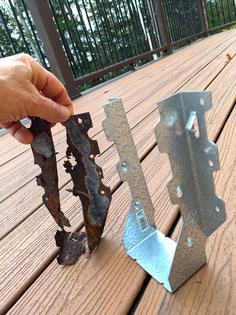Ask the Builder: Beware of rusted joist hangers and nails
One of my newsletter subscribers, Robert, does handyman work on the weekends for friends and other homeowners. Eleven years ago, he wanted to learn how to frame a large shed, including common roof framing. He volunteered to help me build my 16- by 24-foot two-story shed. We’ve been fast friends ever since that week we worked together.
Robert was repairing a deck three months ago. This deck was about 13 miles from Chesapeake Bay in a Baltimore suburb. The joist hangers had severe corrosion. He reached out to me one day and said: “Hey Tim, I’m rebuilding a deck and the joist hangers are rotted. Would you like me to send them to you?”
I responded, “You bet! I’ll gladly pay for the postage.”
I felt like a kid on Christmas morning when the box arrived. The corrosion was severe. Robert even sent some of the rusted joist hanger nails. A few of them had lost well over 60 percent of the steel! The bottom of several hangers had holes in them, and the remaining metal was paper thin.
This deck was a disaster waiting to happen. The structural integrity of the hangers and fasteners was compromised.
I decided to reach out to the Simpson Strong-Tie company. I’ve installed their galvanized-steel framing connectors for decades and never had a rust issue. The public relations firm that works with Simpson connected me to Annie Kao. Annie has worked for Simpson for 18 years, and before her most recent promotion, she was vice president of engineering. That’s exactly who would know the answers to my questions!
It’s important to realize we had no idea who manufactured the joist hangers Robert replaced. They could have been a cheap import with minimal or an inferior galvanizing treatment. Early in our discussion, Annie shared what I thought was the biggest change for Simpson Strong-Tie over the years.
It turns out years ago Simpson purchased raw steel in coils for their products. Simpson had their own galvanizing operation in house. The engineers at Simpson determined it was better to let the steel mills do the galvanizing. This gave birth to the ZMax labeling you see on the Simpson products. ZMax stands for maximum zinc.
I wanted to know what Annie thought about the distance Robert’s hangers were from saltwater. She shared some fascinating data from a Federal Emergency Management Agency (FEMA) document. It was titled "Corrosion Protection for Metal Connectors and Fasteners in Coastal Areas," NFIP Technical Bulletin 8, published in June 2019.
FEMA maintains that the width of the high-corrosion area near breaking salt-water waves is anywhere from 300 to 3,000 feet from the shoreline. Invisible drops of saltwater enter the air when waves break on a rocky coast or the shoreline. This is similar to the tiny drops of windshield washer fluid that covers your windshield when a car hundreds of feet ahead of you cleans their glass.
Backing up my suspicion, the FEMA document verified that accelerated corrosion can happen up to 10 miles inland. My guess is that it's a function of the strength and speed of the prevailing wind and how big the waves are crashing against rocks and sand.
This didn’t square with Robert’s situation. The deck he was working on is located at the far northern end of Chesapeake Bay. There’s very little wave action there like you’d see on Mt. Desert Island at Acadia National Park.
This leads me to believe the homeowner or builder of the deck used an inferior, cheap joist hanger. You may have these on your home. Saltwater exposure is by no means the only cause of severe corrosion of metal connectors on your deck and outdoor play sets.
Severe corrosion can happen in moist, warm climates where saltwater is hundreds of miles away. The copper preservative in the treated deck lumber leaches out with each rainfall. This liquid brew corrodes bare steel and fasteners like child’s play.
High-quality galvanizing that incorporates lots of zinc has a magical property. Should the galvanizing get scratched, the zinc next to the scratch corrodes faster and fills in the scratch! It’s self-healing magic.
Corrosion can be prevented by using stainless steel joist hangers, fasteners, etc. Stainless steel is available in different grades, like many things. The best is 316 stainless steel. Specify or purchase that for your next deck.
It’s imperative you inspect your deck or any exterior structure that incorporates metal connectors. Check for corrosion. Extract a few random fasteners and see if they’re rusted. Replace connector nails with #9 1 1/2-inch galvanized connector screws. They have far greater holding strength.
Subscribe to Tim’s FREE newsletter at AsktheBuilder.com. Tim offers phone coaching calls if you get stuck during a DIY job. Go here: go.askthebuilder.com/coaching
©2024 Tim Carter. Distributed by Tribune Content Agency, LLC.






























Comments